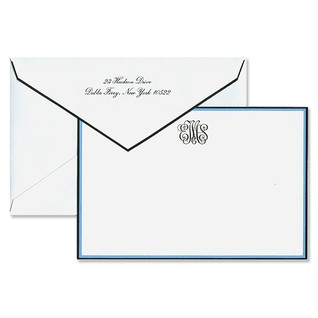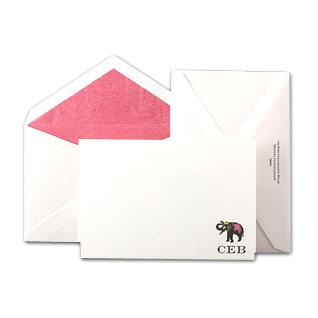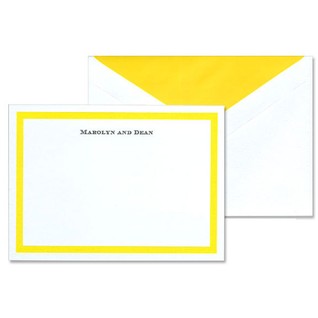Entries Tagged 'Etiquette' ↓
June 24th, 2009 — Etiquette, Travel

Of all of the elements of living the good life that a Gentleman and Lady should master, being a good guest must surely rank at the top of that list. It matters not if you are invited to a tailgate party, church social, summer barbeque, destination wedding, or a country house for the weekend, in your role as the good guest you should be gracious, grateful, considerate and above all entertaining. One of these fundamentals without the other is like driving a car with three wheels. And of all of these entertaining is the most important, particularly for a single Man or Women. If you are able to entertain your host and fit seamlessly into their dinner, event, or household, you will be invited back time and again. When a Man or Women achieves Most-Favored Guest status he or she will have his or her pick of invitations.
House Guest Rules:
Summer is fast approaching and in these challenging times it seems people will be much more frugal than in summer’s past. This means more at-home dinner parties and escapes to friend’s places for the weekend. Let’s say you have been lucky enough to be invited for a weekend getaway. We are not talking about some twelve-person frat boy share here. You have received an invitation to a private house with a small party of friends or better yet, to a friend’s parents’ summer house. Being a house guest is a special privilege and you should prepare for this privilege. There are stories of many a house guest whose true colors were revealed during a weekend in the country and whose name suddenly disappeared from the invitation lists of not only his hostess but all of her friends. When you are a house guest, you must be ever vigil and on your best behavior and at all times cognizant that you are in someone’s house, not a hotel and not your parents’ house but in a friend’s place. The rules for social survival are stricter here than those for any of the other scenarios of being a good guest.
Rule One:
The Respectable Bag. Before you even get in the car or head down to the train station you should pack lightly and carry your things in a presentable bag. No host wants to see you stumbling through her door with loads of luggage or spilling out of plastic trash bags.
Rule Two:
The Hostess (or Host) Gift. You should bring a small gift for your host whether this is your first visit or your fiftieth. If you don’t have time before you leave or would rather wait to shop while you are there, this is fine. It is nice to present something to your hostess that fits with her style and taste. If you are visiting a married couple you would bring one gift meant for the house.
Rule Three:
Don’t Act Like a Guest. The most important rule of being a good house guest is never act like a guest. Do not arrive at someone’s house acting as if you have checked into a luxury hotel. No one is there to wait on you, unless of course there is a staff of servants, but this situation is unique (see Tips for Service below). Here are some things to consider while you are soaking up the hospitality. Offer to drive to the liquor store and fill the cabinet with liquors and mixers. Help prepare the dinner, set the table, clean up after and volunteer to do the dishes. Volunteer to make a simple dessert, or if you are worthless in a kitchen, stop by the famous bake shop in town and pick up an apple cobbler and vanilla ice cream.
Rule Four:
Wear appropriate clothing. Assimilate to the style of your host. Do not come down to breakfast in your boxer shorts. Cover up with a robe or better yet throw on your khakis and a polo shirt. Wash your face and comb you hair while you are at it.
Rule Five:
Adjust to your host’s schedule. If your host retires early, so do you. If your host rises early, you rise early, unless she specifically tells you otherwise.
Rule Six:
Know When to Go. Finally and most importantly, be wary of extending your stay. There is an old gift shop plaque I have seen in many a vacation home that says something to the effect, “If by late Sunday afternoon two drinks turn into three and we ask you to stay another night, please disregard this drunken sentiment and stick to your original plan.” The polite host will sometimes offer — and in most cases an extra day is acceptable — but be extra sensitive to her and the household’s mood. If you sense this is just a perfunctory invitation, hop on the next train and keep to your original plan.
The point here should be clear. You should completely alter your schedule, behavior and expectations to that of your host. If you present yourself as entertaining, pleasant and trouble-free you should have a grand old time and head back to your life well-rested while running through the memory of a weekend well spent. Nobody ever said being a house guest was easy, in fact it can be downright draining sometimes, which is why you should refrain from making a habit of it.
Tips for Service
When you are staying with friends who have permanent, live-in household staff in the city, in the country or at the beach it is appropriate to tip these workers for services performed. These staffers have their normal duties of attending to the household plus the added burden of cleaning up after you. Especially if they make your bed, provide fresh towels and present breakfast and lunch every day. At the end of a trip, slide $10 for every day you were there into an envelope with a little note, “Thank you Matilda.” If there is multiple staff you should leave multiple tips (called “vails” in the Middle Ages). Present the tip in separate envelopes to the cook and to the housekeepers. One side note: make this action discreet. SP once made the mistake of offending a hostess when she discovered the tip to her staff. The misunderstanding in her mind was that her staff is taken care of by her and my tip was offensive. To set the record straight, this hostess was misguided. One does indeed tip household staff. SP stumbled by letting the hostess discover the tip in the first place. Hand the envelope directly to the staff or place it under an object that is impossible to miss.
House Guest DO
Offer to help and anticipate your host’s needs
Keep your room clean and the bed made
Offer to replace or repair anything you break, lose or mishandle
Strip the bed when you leave, fold and leave sheets on top of the bedspread
House Guest Don’t
Act like a guest
Don’t invite friends over or be always on the road visiting others than your hosts
SP recommends: Stylish luggage at any price can be seen first at www.classicluggage.com, www.tumi.com, or www.bottegaveneta.com. These are guides to style and shapes. If you are on a budget, select the style you prefer, jot down the style number and then see if you can find the valise on eBay or craigslist. Or just go to the standby, www.llbean.com and be done with it.
SP also recommends: Hostess gifts can be simple. If you know the host well it is easier to buy something that fits her or his style. If you don’t, here are a few gifts that can’t go wrong: a jar of fancy jam, a leather guest book, monogrammed soaps with your host’s initial, a coffee table book, gardening or cookbook, an ash tray, wine key or bottle opener. Monogrammed paper guest towels or a note pad are always nice. Or an elegant deck of monogrammed playing cards or drink coasters. – Social Primer
May 14th, 2009 — Etiquette

Introductions: Say Your Name
How many times do you find yourself in this social (or business) situation? You are standing in a covey of people immersed in a rolling conversation when all at once you realize that you don’t know the names of some of the people you are talking to. There is a queasy feeling of awkwardness rising in your chest and you don’t know how to correct the situation so you ride the roll through to the inevitable conclusion, parting ways without ever knowing who was who. There is an old saying — referring to a gathering in a private house — that says “The roof constitutes an introduction,” meaning you shouldn’t introduce people in a private home. This is predicated on the assumption that the host has done his job and anyone under his roof should already be introduced to one another. This old rule was accepted in the days before the transportation revolution and familial displacement sent us all scurrying and gathering into far flung places. When your mothers were old acquaintances and all families and friends were well-known in a small community, this rule held true, and so it goes today. But we are a long way from cozy community living. We are citizens or the world. Let us always introduce ourselves.
In today’s hurly burly society one must pay extra attention to the small civilities. In the course of a conversation, it is never too late to say your name. But let’s be clear. You should say your name at the outset and expect the same courtesy of those you are meeting. It is always annoying — not to mention ill-mannered — to introduce one person to another without saying both or more of the parties’ names. And that should be first and last names, mind you. This lapse is yet another casualty of the modern age when we neglect to say someone’s first and last name, or worse mumble incoherently over the din in a crowded room. I know what you are thinking, but what if I don’t know their last name when I make the introduction? Let me be clear. It is not rude to ask someone their last name. Get this out of the way right at the beginning. If you’ve been introduced before and you’ve forgotten this is not a crime to ask again. Just don’t make a habit of it. To habitually forget someone’s name, first or last, is the height of incivility, the depth of laziness and in the end, just plain rude.
On the other hand, you should always remind people of your own name and even volunteer a little history of when you met. “I am Robert Hightower. We met at the Wilson’s Christmas Party.” This will assuage any awkwardness brewing inside the person you are greeting. And this person, in kind, should respond, “Of course I remember, Robert. It is so good to see you again.” No matter if this is true or not. The point of good manners is to make people feel at ease. Generosity is always the first rule of the day.
In greeting and introductions, here are some golden rules to live by:
Always say “How do you do?” or “It’s great to see you.” Never say “It’s nice to meet you,” unless you are absolutely positive you have never met before. In fact, you should simply remove this phrase from your social repertoire altogether and always say “It’s nice to see you.”
Never say “Do you remember me?” This puts the other person in the awkward position of saying “No.”
Never announce a person’s vocation in a social introduction. In business, the opposite is true. If the gathering is business and social, then by all means include the vocation.
Finally, never put someone on pause that has come up to you to say hello. If you are so engrossed in a story with Helen Highwater that you feel compelled to ask Jasper Jones to hold while you finish, you should remove Mrs. Highwater to a private room — or go outside — so as not to be interrupted. Or better yet, call her the next day. Put yourself on pause, never Mr. Jones. This incident is far too common and exceedingly rude. On the other hand, Jasper Jones should not interrupt someone who is obviously engrossed in deep, gesticulating conversation. Although gesticulating conversation has no place at a drinks party, some people do engage in such. SP says keep it light and always be open to widening your circle. Isn’t this why you attend these things in the first place?
www.SocialPrimer.Com
March 1st, 2009 — Etiquette

Wedding Thank-you’s
There is nothing more appreciated than a lovely handwritten thank-you note. Some tips from Peggy Post on turning this obligation into a pleasure not a chore.
When should notes be written?
Contrary to popular myth, the happy couple does not have a year’s grace period. All thank you notes should be written within three months of the receipt of the gift. Ideally, a response should be written on the day you receive a wedding gift. If that’s not possible, set a daily goal. It’s a lot easier to write three or four notes a day than to have to write a hundred notes in a month after the wedding!
What stationery should be used?
First of all, stationery is the operative word here: No fill-in-the-blank cards, no pre-printed cards, no phone calls, no emails and no generic post on your website!
Who needs a note?
*Anyone who gives you an engagement, shower or wedding gift, even if you have thanked them in person. Individual notes should be written to people who contributed to a group gift.
*Anyone who gives a gift of money: cash, checks, contributions to savings accounts and donations to charities. Mentioning the amount is optional, but it does let the person know the correct amount was received. You should mention what you plan to do with the money.
*Your attendants. A warm personal note attached to your gifts to your attendants will let them know how much you appreciate their efforts and support on your behalf.
*Anyone who hosted a party or shower for you. Ideally these notes should be written within two days of the event. Each host or hostess should be thanked individually with a note and a thank you gift.
*People who house or entertain your wedding guests. A note and a small gift should be sent to anyone who houses or entertains out-of-town wedding guests.
*People who do kindnesses for you. The neighbor who accepts delivery of your gifts when you are at work; the cousin who supervises the parking at the reception – anyone who assists you before, during or after your wedding.
*Suppliers and vendors. You don’t have to write everyone you hire for services, but anyone who exceeds your expectations will appreciate a courteous note of thanks.
*Your parents or whoever is hosting your wedding.
– Emily Post.Com
January 3rd, 2009 — Etiquette, Wedding

Don’t forget the three C’s
Not clarity, cut or color. We’re talking about consideration, communication and compromise. How you handle your wedding plans can foretell how you will handle the other major decision of your life together. Along with the stress that will accompany the big decisions and little details should be a sense of adventure and fun. You are celebrating one of the most joyous milestones in your lives. Do so with a focus on consideration, communication and compromise and the process is sure to be smoother.
November 6th, 2008 — Etiquette, Stationary

















